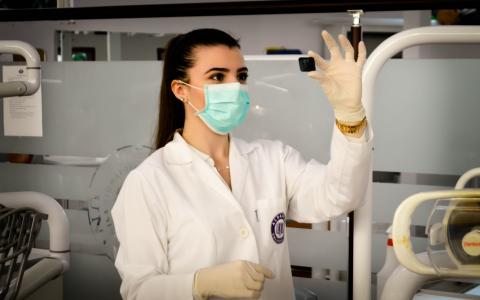
The new coronavirus that recently emerged in the Hubei Province of China is dominating headlines. With more than 80,000 cases reported, it’s only natural to get spooked. Some people have even started wearing face masks in the United States; but are they really necessary? Here are the answers to your most common face mask questions.
Do I Really Need A Mask? If So, Which Kind?
Unless you’re currently in the Hubei Province right now, probably not. Fewer than 100 confirmed cases have appeared outside of China so far. The CDC still says the coronavirus threat to the general American public is low, and there have only been 5 confirmed cases in four states (California, Washington, Arizona and Illinois). All of those cases involved recent travel to China—and there’s no sign yet that it’s spread from person to person. So right now, it’s unlikely that anyone in the U.S. needs to worry about wearing a mask.
That said, we do know that the coronavirus is more severe for people who are elderly or already have health issues. Plus, the United States is currently experiencing a pretty bad flu season, and the advice below applies to the flu as well. So if you live in a region where there’s been a confirmed coronavirus case, or folks around you have the flu, you may want to wear a mask for your peace of mind. (Also, get a flu shot if you haven’t yet.)
Though it’s not yet been firmly established how this novel coronavirus spreads, related diseases, including SARS and MERS, are airborne and can spread through tiny droplets expelled whenever someone coughs or sneezes. These droplets can also linger on surfaces and hitch a ride to the respiratory tract if someone touches them and then brings their hand to their nose or mouth.
The CDC recommends that health workers who interact with coronavirus patients wear N95 masks. These are a type of respirator mask that fit closely to the face and are designed to filter out small particles from the air. If a face mask has an “N95” designation, that means that it will filter out 95% of particles as small as 0.3 microns from the air. The viruses in the coronavirus family are all quite large (at least by virus standards), and on average they are a little over 0.1 microns. So theoretically, even with an N95 mask some virus particles could still get through. It’s also important to note that N95 masks don’t work well for children or people with facial hair, and people who already have lung issues may find it harder to breathe when wearing one of these masks.
N95 masks are considered a medical device and are regulated by the U.S. Food and Drug Administration. You can see a list of FDA-approved masks here.
You might see people wearing surgical masks; those flimsy paper masks that hook behind the ears. Unfortunately, those masks are typically too loose to really be effective in stopping the virus.
But Do They Actually Work?
It depends on the type of mask. No mask can 100% prevent disease, and there is very little data actually examining how these masks hold up against various diseases. One study from 2008 did show that respirator masks protect against a fluorescent spray, and you can see the gnarly black light pictures here.
Some types of masks, however, can actually do more harm than good. A randomized study by a research group in Australia found that wearing cloth masks is not only ineffective, but may also increase the risk of contracting respiratory infections. These types of masks, “may absorb moisture and provide a breeding ground for bugs,” says Raina MacIntyre, an author of the study and a professor of Global Biosecurity at The University of New South Wales in Sydney.
Who Makes These Masks?
Several big companies make surgical and N95 respirator masks. One of the biggest is Makrite; it produces several FDA-approved masks and is headquartered in Taiwan. 3M is another company that sells office and lab supplies and has FDA-approved N95 respirators; it is headquartered in Saint Paul, Minnesota. Some face masks are produced in Chinese factories, but the masks available for purchase in China are significantly more expensive than in the United States.
Are Their Stocks Going Up?
Some yes, some no. Stocks of companies that create protective gowns, such as Lakeland Industries, have gone up. Other companies, like 3M, have fallen, though that’s likely unrelated to the coronavirus and more linked to disappointing earnings and the uncertainty currently impacting global markets.
Will There Be Shortages?
There already are. Several major cities are already experiencing shortages, and areas around the few reported U.S. coronavirus cases are especially hard-hit. And if you think you can just order one on Amazon instead, don’t hold your breath. A look at the website shows that many N95 masks are listed as currently unavailable or temporarily out of stock. Amazon has not yet returned a request for comment about when masks may again become available.
If I Can’t Find A Mask, What Should I Do?
First of all, don’t panic. Remember, the chances of even needing a mask are extremely slim right now if you’re not a doctor taking care of coronavirus patients. There are still several things that you can do to protect your health: wash your hands often (and really wash them, with hot water and soap), avoid touching your face or rubbing your eyes, cook all of your food thoroughly, get enough sleep, make sure you’re eating healthy and stay away from anyone who is suspected to be sick with the virus (basically, all the things your mom always told you to do). For the time being, you should be fine.
This article originally appeared on Forbes.



